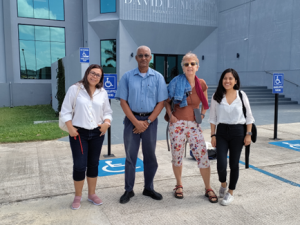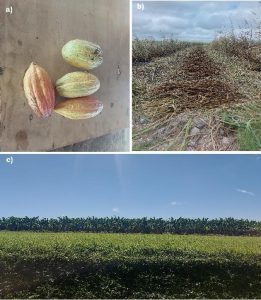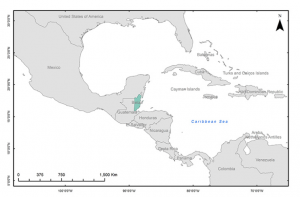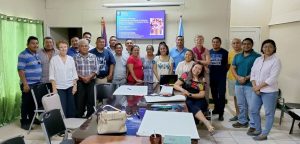August 8, 2023, by lzzre
Climate Change and Agriculture in tropical countries: Integrated ClimAte Resilience UnderStanding (ICARUS), Belize
Sofia Márdero, Betsabé de la Barreda, Oriol Ambrogio Gali, Sarah Metcalfe and Franziska Schrodt
Climate change is one of the greatest threats facing the world today, presenting particular challenges to developing countries, where a large part of the population lives in physically exposed places and in precarious economic conditions. Moreover, a significant percentage of these countries’ revenue is directly dependent on climate-sensitive natural resources. A clear example of this is the Central American country of Belize (Fig. 1), where the performance of the main economic activities like agriculture, fishing, logging and tourism is largely dependent on a predictable climate. Among these sectors, agriculture is critical to Belize’s development, given its importance in food self-sufficiency, employment, and as one of the country’s major exports and source of earnings of foreign exchange. Climate change and extreme events are having a considerable impact on the sector, as Belize experiences an increase in the occurrence of sustained droughts, floods and changing precipitation patterns.
With our project Integrated Climate Resilience Understanding “(ICARUS) Belize”, we aim to better understand the impacts of climate change and extreme events on Belize’s agricultural systems and rural livelihoods, integrating multiple sources of information (both quantitative and qualitative) at different time scales. A valuable source of information for our project is community experience, for which members of the ICARUS team conducted a first round of fieldwork in towns in southern, central and northern Belize, during January 2023. During this fieldwork, the team visited farms that cultivate the most important crops nationwide (e.g. sugar cane, banana and citrus) and interviewed farmers. In addition, the team conducted meetings and interviews with members of the project´s advisory panel, including the Ya’axché Conservation Trust, the Ministry of Agriculture and the Caribbean Community Climate Change Centre (Fig. 2).
This first fieldwork provided us with valuable information into the functioning of farming systems across the country. It also allowed us to better understand how small, medium and large-scale farmers perceive, experience and respond to climate change, and to begin to learn what is the role of governmental institutions and NGOs in climate change adaptation processes in the country.

Figure 2. Meeting with the Caribbean Community Climate Change Centre during the first fieldwork (January 2023)
During our fieldwork, we learned that agriculture in Belize can be broadly characterised by three main subsectors: a) a well-organized export-oriented commercial subsector specialising mainly in banana, citrus, and sugar cane (and in recent years an increasing amount of coconut production) (Fig. 3); b) a highly diverse, medium – smallholder subsector producing a wide range of food crops (especially vegetables), mainly for personal consumption and the local market; and c) a large-scale commercial subsector dominated by Mennonites (religious group from Central Europe, now widely distributed in Belize and several Latin American countries) producing grains and livestock products for both local and export markets.

Figure 3. a) Cocoa in Toledo District, b) Sugar cane plantation in Corozal, c) Banana plantation in Stann Creek.
Based on interviews and workshops (Fig. 4) farmers in Belize highlighted two main challenges facing the sector in the country: climate change (and associated pests and diseases) and the high cost of agricultural inputs. The main manifestations of climate change experienced in the country are rainfall variability and increased extreme events such as hurricanes and droughts. These changes have different effects on national agriculture: while cocoa producers in the south may benefit from more rainfall throughout the year, sugar cane producers in the north, and citrus and banana producers in the centre of the country are affected by droughts and floods, which usually lead to the proliferation of pests and diseases.
According to banana producers, in 2022 excessive rain and diseases caused the three biggest banana plantations to lose around 90 000 bunches. Similarly, Hurricane Lisa on 02 November 2022 caused a number of sugar cane producers in the north to lose up to 80% of their harvest, as the water level reached up almost half a metre high in some plots. Vegetable producers have experienced a decline in production of up to 30% in the last 5 years, mainly due to drought and diseases. The citrus industry has also been one of the most affected, especially in the year 2022 when, according to the Citrus Growers Association, 75% of citrus production was affected by the citrus greening disease (the transmission of which is related to temperature), leading to changes in the quality and taste of citrus juices for export.
Despite the vulnerability of the agricultural sector to climate change in Belize, government support to farmers in the event of weather-related losses is almost non-existent, and decisions regarding which crops to promote in the country are largely driven by market demands, rather than climatic conditions. In order to maintain agricultural production in the face of a changing climate, farmers have developed different responses and adaptations over time, such as the installation of irrigation systems, crop diversification, increased use of agrochemicals and changes in the agricultural calendar.
The “strategy” of increasing the use of agrochemicals to counteract the effects of climate change and low soil fertility poses different challenges especially for small and medium farmers, who struggle to cover the high costs. The excessive use of agrochemicals has also caused various environmental problems such as soil and water pollution. Because of concerns about this, farmers in different parts of the country are engaging in more sustainable agricultural practices, usually supported by NGOs such as the Ya’axche Conservation Trust, and by different international funds (such as those of the World Bank, Sustainable Harvest International) to achieve a more sustainable and resilient agricultural sector.
In our second fieldwork campaign (planned for September & October 2023) we will conduct further interviews and workshops with farmers, NGO members and government institutions, we plan to extend our understanding of the dynamics between climate change and extreme events, and agriculture at various scales and rural livelihoods in Belize. Through this and other sources of information such as instrumental records, satellite imagery, historical records and palaeoenvironmental data, we hope to gain a comprehensive understanding of the resilience of Belize towards extreme climate events and how it can be used to inform future planning and decision-making.
Stay tuned for the latest project updates through our upcoming blogs, and check out our previous blog “Integrated ClimAte Resilience UnderStanding (ICARUS), Belize” https://blogs.nottingham.ac.uk/geography/2023/03/27/integrated-climate-resilience-understanding-icarus-belize/ , our Twitter @ICARUS_Belize and our website https://www.nottingham.ac.uk/research/groups/icarus/ for more details on our project and updates.
No comments yet, fill out a comment to be the first



Leave a Reply